By Mike Bartlett. Secret House, New Ghosts Theatre Company and Seymour Centre. Seymour Centre, July 29 – Aug 13, 2022.
Reviewed : July 27, 2022*
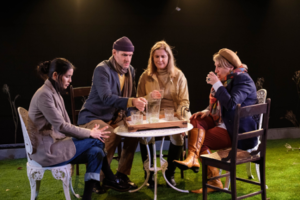
Unlike many contemporary plays, (one act, no interval, 70 to 90 minutes in length) Albion is more a ‘modern classic’ – think plays Arcadia, August: Osage County, Hotel Sorrento, When the Rain Stops Falling. It is long (3 hours) and whilst not a ‘family saga’, it takes a family through memories, hopes, loss, failings and falling outs.
Mike Bartlett sets his play in modern Britain. Audrey (Joanna Briant) has sold her London home to buy ‘Albion’, an old seven-bedroom country home in Oxfordshire where she spent holidays in her youth. She aims to revitalise the estate and its gardens as a memorial to its original owner and ‘designer gardener’, and a place to scatter the ashes of her lost soldier son, James. In doing so, she uproots her tolerant husband Paul (Charles Mayer) and reluctant daughter, Zara, (Rhiann Marquez) from their happy life in London, and along with her son’s girlfriend Anna (Jane Angharad), instils them as part of her dream.
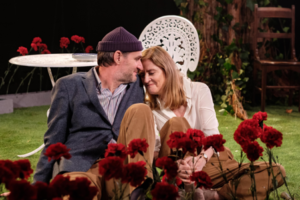
Bartlett uses the effect of Audrey’s single-minded determination to infer some of the political, social and economic instabilities of Brexit Britain and, ambitiously, the effects of changing attitudes to class, status, immigration, same sex relationships and the ethical possibilities of IVF. A difficult task indeed, but one Bartlett handles skilfully in words and relationships, extrapolations … and a little bit of caprice.
Lucy Clements acknowledges this with a directorial vision that allows the caprice to permeate the production. The garden, artfully created by designer Monique Langford, combines realism and imagery to suggest a lost past that may defy restoration. A tree trunk reaches high, its branches suspended above a rectangle of green lawn edged by narrow flower beds. Its Englishes-ness is as definitive as Audrey herself. Lighting designer Kate Baldwin enhances this with wispy, soft effects to which sound designer/composer Sam Cheng adds gentle birdsong – and some sounds that are a little less gentle, but startlingly effective.
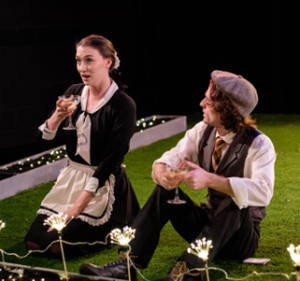
In keeping with the changing colours of the garden, Langford and assistant costume designer Aloma Barnes accentuate the touches of eccentricity in the plot and the characters with costumes that mix contrasting colours, flashes of light and quirky accessories with more sombre, grounding shades. Paul’s grey beanie contrasts with Audrey’s ‘woman of the manor’ style – and her friend Katherine’s (Deborah Jones) quirky headdresses.
These production concepts provide a cunning vehicle for Bartlett’s characters to relate in an environment ruled by a dominant woman who allows her rigid resolve and conservative values to turn her daughter, her son’s partner, her oldest friend, her new neighbour and a small village against her.
Lucy Clements fosters the strain of those relationships in direction that uses carefully blocked distances and watchful stillness to heighten emotional response. Wherever the characters are, they are constantly aware of each other, aware of rising tension, attune to what might happen next – whether they are part of Audrey’s London ‘incomers’ – or the staff and neighbours who feel a long-time proprietorship of Albion and its gardens.
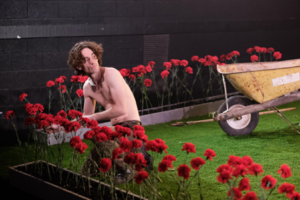
Briant’s Audrey is a powerful presence permeating the mood of the production with her uncompromising opinions, persuasive coercion tactics and careless classicism. It is not easy to empathise with this character, until Briant eventually shows a little of the loneliness that comes with inflexibility and intransigence – and how much she really appreciates the unwavering devotion of her husband … and, ultimately, her daughter.
Mayer’s Paul is a strong, quiet presence. He listens and watches patiently, stepping in only to avert an escalating argument. Marquez creates a Zara who fights her resentfulness with restless energy and eventual defiance as she leaves Albion to return to London with Katherine.
Deborah Jones makes Katherine a formidable figure. A recognised author, she is strong, approachable. Very aware of Audrey’s personality, she is prepared to accept her shortcomings – but only to a certain extent!
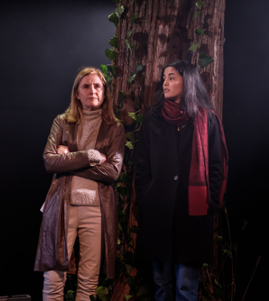
Anna, though not officially part of the family, is determined to fulfil the promise she shared with James before he left for his final tour. To do this, she accepts Audrey’s invitation to visit – and stays. Angharad finds Anna’s unyielding resolve as well as the raw, empty hunger of lost love.
Mark Langham and Claudette Clarke play the gardener Matthew and housekeeper Cheryl, who have been loyal retainers at Albion for twenty years. They are county folk, who know their place, but are used to being treated with respect – something that Audrey does not understand nor practise. Their hurt is manifested with quiet dignity until Cheryl dares to question Audrey.
James Smithers is appealing as Gabriel, the boy next door, who writes poetry and becomes increasingly confident as he develops friendships with Zara and Katherine.
Emma Wright is Krystyna, a Polish migrant whom Audrey ‘installs’ over Cheryl in the house. Eric Ebert is the next-door neighbour who is disappointed in Audrey’s decision not to open the gardens of Albion for a local festival. Ash Matthews appears as manifestations of James.
Albion the stately home establishes the time and place and background of Albion the play. Lucy Clements sees, however, that:
“Despite Albion being so specific to its English setting, these politics and values have rung true for us here too. Above all, the play’s debate regarding romanticising the past feels even more loaded and relevant when staged in Australia”.
That may be so, but the Albion Clements has directed does stand fast in its English-ness. She and her cast and crew have created a little bit of England that rings clear and true. Perhaps that’s why she chose ‘The World in Union’ as part of the music prior to the opening of the play! Though it’s oft’ regarded as the ‘Rugby Song’, it’s words suggest the tenor of Batrlett’s play:
We face high mountains
Must cross rough seas
We must take our place in history
And live with dignity
* Opening Night